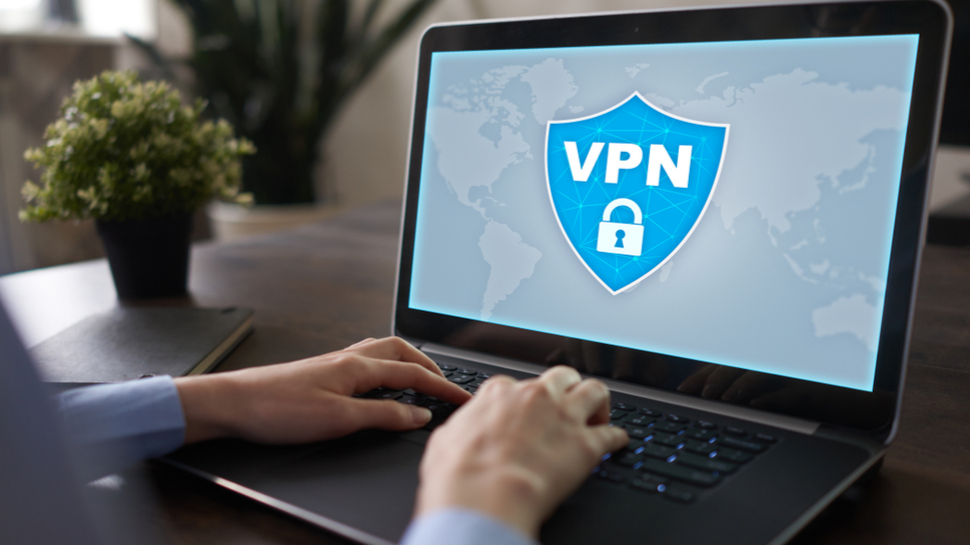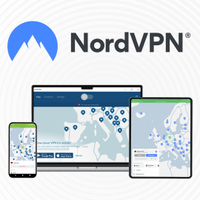Working from home? Here's how a VPN can help
Remote working the right way

Remote working definitely has its perks. It's flexible and lets you pick and choose where you'd like to tackle those emails, but it's not without its risks.
Hackers, scams, malware, and dodgy ads are all out there. The good news is that the best VPNs provide an extra layer of protection that'll boost your overall digital privacy – and help you check out geo-restricted sites and content. Plus, you don't have to be a tech expert to use one.
Below, I've rounded up the biggest and best reasons to use a VPN when working remotely, whether that’s from your home office or a cozy cafe.
NordVPN - from $3.39 per month
The best VPN for remote work
NordVPN is my top recommendation for folks looking to secure their devices when they're away from home or the office. NordVPN's new and improved Threat Protection comes with malware detection, ad blockers, and a password manager, which will protect you from all sorts of cyberthreats, and the free Meshnet tool allows you to connect up to 60 devices and share large files and other private data with ease. NordVPN also comes with second-to-none unblocking powers, making it a perfect pick for streamers everywhere. You can take NordVPN for a risk-free test drive with its 30-day money-back guarantee.
1. Better digital privacy
VPNs have become synonymous with improved digital privacy thanks to their ability to hide your online activity from third-party snoopers.
The same applies to your work activity, too, and it's why I recommend them to the remote workers I chat with – especially if they regularly handle information or classified data.
A VPN makes your internet unreadable to snoopers by routing it through an encrypted tunnel. It passes from your device, through the tunnel, and over to one of its secure servers – rather than a potentially unsecure one owned by your internet service provider (ISP).
Additionally, your VPN will cloak your original IP address and replace it, temporarily, with one of its own, so bad actors (like cybercriminals, your ISP, and your government) can't trace your online activities back to you.
Get daily insight, inspiration and deals in your inbox
Sign up for breaking news, reviews, opinion, top tech deals, and more.
It's also worth noting that the benefits of VPN protection extend beyond your workday, as it'll also prevent snoopers from keeping tabs on your browsing history and what internet applications you use as you go about your post-work browsing.
2. Stay safe on public Wi-Fi
The free Wi-Fi you find in public places like cafes, airports, and libraries is handy, for sure, and ensures you're never cut off from the internet. Naturally, tons of remote workers rely on these hotspots.
Unfortunately, the reality is that free Wi-Fi is notoriously unsecure. The networks typically lack the same encryption that your home network has – and they're "open" networks, too, meaning they don't require a password or login credentials to access.

Looking for a VPN that won't skimp on security? Check out our guide to today's best secure VPNs.
The unencrypted nature of these connections makes public Wi-Fi hotspots a tempting target for hackers. They'll exploit them to steal the identifiable details of anyone connected to the network – without their victims even being away.
Imagine the havoc this could cause if sensitive information, like card information, login credentials for your workplace's database or bank accounts, or patient information ended up in the hands of cybercriminals with connections to the dark web.
It's not all bad news, though, because a VPN puts a stop to these threats by encrypting all of your traffic.
This ensures that any opportunistic cybercriminals can read it, even if they intercept it, and subsequently won't know which sites you're frequenting, who you're talking to, or what information you're inputting into digital forms.
3. Secure file sharing
Remote workers often need to exchange files, share resources, and download materials from the company's internal databases – but doing so over an unsecured network (such as public Wi-Fi) is dangerous.
Snoopers can intercept your traffic and keep the files, however sensitive (think financial reports, payment details, patient information, and whatnot), for themselves to exploit later.
A VPN encrypts the connection between two points to ensure that any data passing between them remains secure from prying eyes.
A VPN prevents you from becoming the weak link in your workplace's security
What's more, your VPN prevents you from becoming the weak link in your workplace's security, ensuring that cybercriminals can't access any company resources. There are even VPNs that come with their own ad-blocking and malware-detection tools that'll sniff out viruses and other digital nasties hidden in any files you download.
When it comes to file sharing with a VPN, however, NordVPN leads the pack thanks to its free Meshnet tool. It allows you to create your own private network over the internet and share stuff with other devices (that, by the way, can only join the Meshnet with your permission).
Meshnet lets you link as many as 60 devices at a time – so everyone in your team can join, no matter where they are in the world, and you send and receive files without size or storage restrictions.
Plus, Meshnet doesn't compress files, which is especially useful if you’re sharing marketing materials or images and don't want to sacrifice quality.
4. Unblock everything
One of the main reasons why VPNs have become so popular is thanks to their awesome unblocking power. They can access geo-restricted streaming content, which is cool, and even unblock news outlets, journalistic resources, and other sites that ISPs, governments (like China and Russia, for example), and network admins might have locked away.
This is vitally important for journalists, students, and researchers who need access to unbiased information without compromising their identity (and therefore their safety) in regions where the government is constantly trying to suppress dissidents.

Wondering which VPN works best with Netflix and BBC iPlayer? We've ranked today's best streaming VPNs for you.
With a VPN on your device, you'll be able to use the internet without any restrictions, no matter where you are on the map.
What's the secret to a VPN's unblocking capabilities? As I mentioned earlier, it conceals your original IP address and replaces it with one of its own when you connect to a VPN server.
As a result, the sites and services you visit will read your shiny new IP address and think you're in the same location as the server you chose. This is what we call geo-spoofing – and today's top providers have massive networks of servers all over the world.
5. Cross-platform versatility
Modern-day VPNs aren't restricted in terms of which devices they're compatible with; they're made for all consumers and platforms, meaning you need just one VPN with enough simultaneous connections to cover all your devices (Android, iOS, Windows, Mac, Linux, etc.), no matter where you go.
This is convenient and cost-effective, especially if you're someone who fires off work emails via their iPhone but connects to team meetings on their laptop.
There are even VPNs that offer unlimited simultaneous connections (like Surfshark). Not only is this seriously generous, but it also means you can share your login with friends and family so they can secure their own gadgets – so long as you're feeling equally generous.
It's worth mentioning that some VPNs work on routers, too, which secure your Wi-Fi connection at its source.
As a result, any device you connect to the VPN-enhanced router will enjoy the VPN encryption by default - no app necessary.
The bes VPN routers come in extremely handy if you're after convenience (you won't have to remember to activate the VPN on every device) or would like to protect devices (like gaming consoles) that don't natively support VPN connections.
How to choose a VPN for remote work
VPNs come in all shapes and sizes, and there are hundreds, if not thousands, of them on the market right now.
So, if you're a remote worker looking for the perfect fit, here are the features to look out for:
- Speed: fast VPNs allow for smooth and uninterrupted file sharing, buffer-free streaming, and better overall web browsing, even when you're out and about.
- Security: look for a VPN with strong encryption, modern VPN protocols, a reliable kill switch, and a rock-solid no-logs policy (preferably audited) to ensure your data is kept private at all times.
- Device support: make sure the VPN has compatible apps for the devices you use for work. Additionally, check that there are enough simultaneous connections to cover all your devices.
- Customer service: 24/7 live chat means you'll never be left hanging if something goes wrong. Look for an in-depth knowledgebase and other support channels, such as email tickets.
- Servers: a large number of servers will give you more locations to choose from and ensure you always have a server nearby, no matter where you are.
- Price: a good VPN doesn't have to cost a fortune – the best cheap VPNs will allow you to stay within your budget and still get a comprehensive, high-quality service.
Disclaimer
We test and review VPN services in the context of legal recreational uses. For example: 1. Accessing a service from another country (subject to the terms and conditions of that service). 2. Protecting your online security and strengthening your online privacy when abroad. We do not support or condone the illegal or malicious use of VPN services. Consuming pirated content that is paid-for is neither endorsed nor approved by Future Publishing.
Krishi covers buying guides and how-to's related to software, online tools, and tech products here at TechRadar. Over at Tom's Guide, he writes exclusively on VPN services. You can also find his work on Techopedia and The Tech Report. As a tech fanatic, Krishi also loves writing about the latest happenings in the world of cybersecurity, AI, and software.
